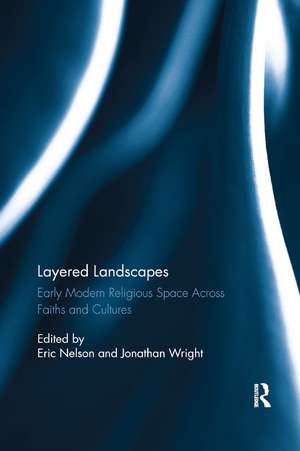Layered Landscapes: Early Modern Religious Space Across Faiths and Cultures
Editat de Eric Nelson, Jonathan Wrighten Limba Engleză Paperback – 12 dec 2019
| Toate formatele și edițiile | Preț | Express |
|---|---|---|
| Paperback (1) | 388.13 lei 6-8 săpt. | |
| Taylor & Francis – 12 dec 2019 | 388.13 lei 6-8 săpt. | |
| Hardback (1) | 765.43 lei 6-8 săpt. | |
| Taylor & Francis – 24 mai 2017 | 765.43 lei 6-8 săpt. |
Preț: 388.13 lei
Nou
Puncte Express: 582
Preț estimativ în valută:
74.27€ • 77.75$ • 61.45£
74.27€ • 77.75$ • 61.45£
Carte tipărită la comandă
Livrare economică 05-19 aprilie
Preluare comenzi: 021 569.72.76
Specificații
ISBN-13: 9780367880484
ISBN-10: 0367880482
Pagini: 254
Dimensiuni: 156 x 234 x 14 mm
Greutate: 0.42 kg
Ediția:1
Editura: Taylor & Francis
Colecția Routledge
Locul publicării:Oxford, United Kingdom
ISBN-10: 0367880482
Pagini: 254
Dimensiuni: 156 x 234 x 14 mm
Greutate: 0.42 kg
Ediția:1
Editura: Taylor & Francis
Colecția Routledge
Locul publicării:Oxford, United Kingdom
Cuprins
Introduction
[Eric Nelson and Jonathan Wright]
Section I: Shared and Contested Sacred Landscapes
1. Jerusalem in the Reinvention of the Catholic Tradition, 1500–1700
[Megan C. Armstrong]
2. Sacred Landscape in Early Modern Granada: Muslim Past and Christian Present
[A. Katie Harris]
3. Temple to Town Hall: Sacred and Secular in Prague’s Jewish Town
[Rachel L. Greenblatt]
Section II: Sacred Landscapes, Ritual and Devotion
4. Gods and Goddesses in the Ritual Landscape of Seventeenth- and Eighteenth-Century Kāñcipuram
[Ute Hüsken]
5. Ritual, Public Space and Indigenous Engagement in Colonial Cuzco
[Gabriela Ramos]
6. Layers of Memory and Devotion: Temples, Shrines and Pilgrimage in Early Modern Edo
[Barbara R. Ambros]
Section III: Sacred Landscapes and Transition
7. Transforming the Orthodox Landscape of Ottoman Istanbul During the Early Modern Period
[Hasan Çolak]
8. From Prince-Bishopric to City-State: Nationalizing the Church and Creating a Republic in Reformation Geneva
[William G. Naphy]
9. The Layered Theoscape of Philadelphia: The Quaker Experiment as a Religious Crucible
[Pink Dandelion]
Section IV: Sacred Landscapes and Power
10. Religion Royale in the Sacred Landscape of Paris: The Jesuit Church of Saint Louis and the Resacralization of Kingship in Early Bourbon France (1590–1650)
[Eric Nelson]
11. The Basilica of St. John Lateran and the Post-Tridentine Papacy: Refashioning the Sacred Landscape
[Ingrid D. Rowland]
12. Two Tales of One City: Herat Under the Early Modern Empires of the Timurids and Safavids
[Colin Mitchell]
Epilogue: Jamme Masji
[Eric Nelson and Jonathan Wright]
Section I: Shared and Contested Sacred Landscapes
1. Jerusalem in the Reinvention of the Catholic Tradition, 1500–1700
[Megan C. Armstrong]
2. Sacred Landscape in Early Modern Granada: Muslim Past and Christian Present
[A. Katie Harris]
3. Temple to Town Hall: Sacred and Secular in Prague’s Jewish Town
[Rachel L. Greenblatt]
Section II: Sacred Landscapes, Ritual and Devotion
4. Gods and Goddesses in the Ritual Landscape of Seventeenth- and Eighteenth-Century Kāñcipuram
[Ute Hüsken]
5. Ritual, Public Space and Indigenous Engagement in Colonial Cuzco
[Gabriela Ramos]
6. Layers of Memory and Devotion: Temples, Shrines and Pilgrimage in Early Modern Edo
[Barbara R. Ambros]
Section III: Sacred Landscapes and Transition
7. Transforming the Orthodox Landscape of Ottoman Istanbul During the Early Modern Period
[Hasan Çolak]
8. From Prince-Bishopric to City-State: Nationalizing the Church and Creating a Republic in Reformation Geneva
[William G. Naphy]
9. The Layered Theoscape of Philadelphia: The Quaker Experiment as a Religious Crucible
[Pink Dandelion]
Section IV: Sacred Landscapes and Power
10. Religion Royale in the Sacred Landscape of Paris: The Jesuit Church of Saint Louis and the Resacralization of Kingship in Early Bourbon France (1590–1650)
[Eric Nelson]
11. The Basilica of St. John Lateran and the Post-Tridentine Papacy: Refashioning the Sacred Landscape
[Ingrid D. Rowland]
12. Two Tales of One City: Herat Under the Early Modern Empires of the Timurids and Safavids
[Colin Mitchell]
Epilogue: Jamme Masji
Notă biografică
Eric Nelson is Professor of History at Missouri State University.
Jonathan Wright is Honorary Fellow in the Department of Theology and Religion at Durham University.
Jonathan Wright is Honorary Fellow in the Department of Theology and Religion at Durham University.
Descriere
This volume explores the conceptualisation and construction of sacred space in a wide variety of faith traditions: Christianity, Hinduism, Islam, Judaism, and the religions of Japan. Through the prism of layering, it demonstrates that vital questions about the location of the sacred and its reificaiton in the landscape were posed by religious be
